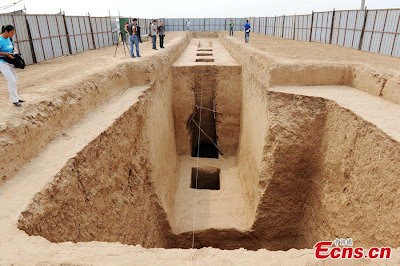Archaeologists have discovered the
tomb of a 7th-century female politician who was one of the most powerful
women in China's ancient history, local media said.
Shangguan Wan'er -- who lived from
664 to 710 in the Tang dynasty -- was a trusted aide to China's first
empress Wu Zetian and is sometimes described as effectively her prime
minister.
She married Wu's son, while having relationships with both the ruler's lover and her nephew.
As a sequence of murders, coups and
affairs enveloped the dynasty, Shangguan Wan'er's husband Li Xian
briefly became emperor -- only to be killed by his senior wife, who took
power herself.
She was deposed in turn by Li Longji, who killed both her and Shangguan Wan'er.
The site was discovered near an
airport in Xianyang, in the northern province of Shaanxi, and confirmed
by an inscription, China Radio International said on its website.
Pictures showed deep excavations of ochre-coloured earth, arched passageways and a number of ceramic horses.
"The discovery of the tomb with the
epitaph is of major significance in the study of the Tang Dynasty," the
China Daily said, citing a historian specialising in the era, Du Wenyu.
The grave was badly damaged,
suggesting a "large-scale, organised" and possibly "official
destruction", Geng Qinggang, a Shaanxi-based researcher told the China
News Service on Thursday.
No gold or silver treasures, or complete bones, had been found at the site, he added.
Shangguan Wan'er was also recognised for her poetry.




No comments:
Post a Comment